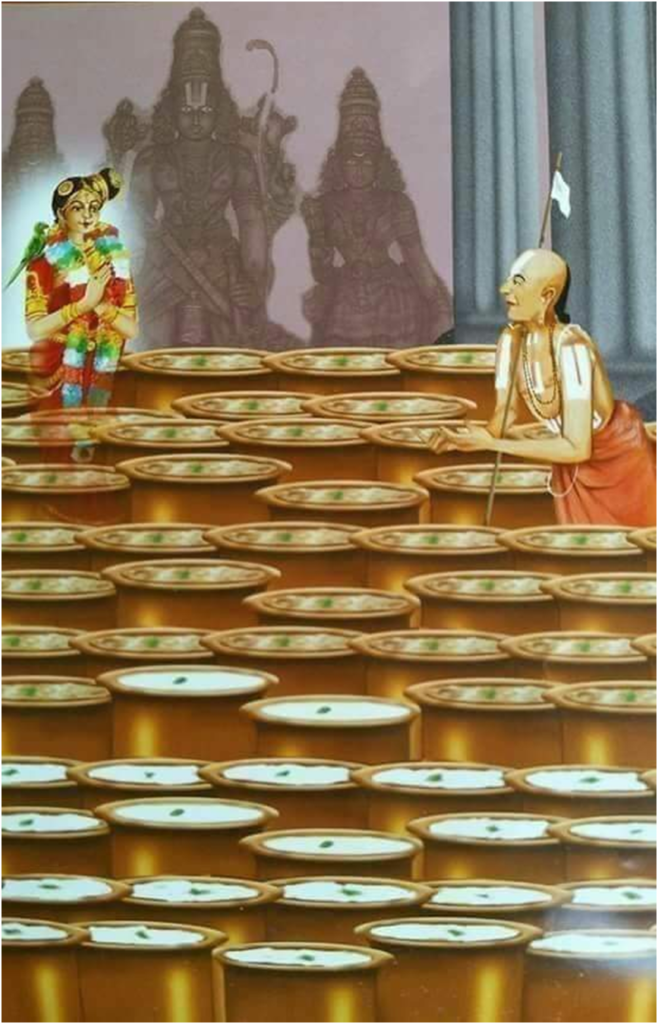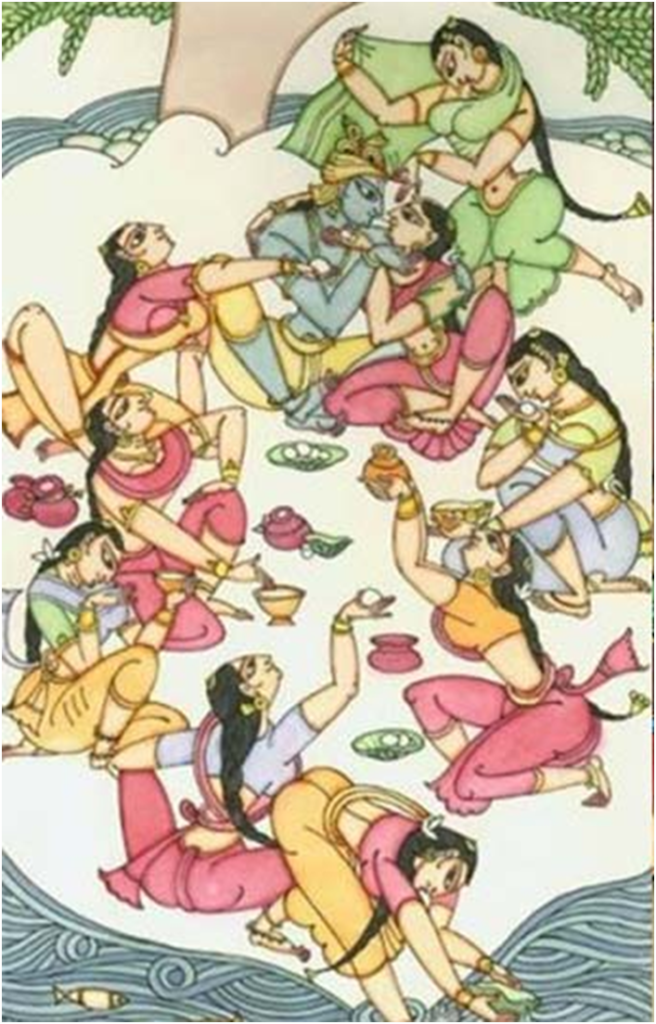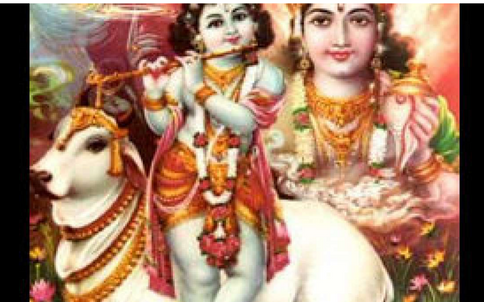Madabhushi Sridhar -Tiruppavai27
Tiruppavai by Godadevi from Tamil
Koodarai Vellum seer Govinda, Undrannai
PaadiparaikonduYaamPerumSammanam
NaaduPugazhumParisinaalNandraga
SoodagameTholvalaiyeThodeSevippoove
PadagameyEndranaiyaPalkalanumYaamAnivom
AadaiyUduppom Adhan PinnePaarShoru
MoodaneiyPeydhuMuzhankaiVazhivara
KoodiYirundhuKulirindh el or empaavaai
English Translation from By Madabhushi Sridhar
O Govinda, you will win rivals with valour,
We, sing your glory, seek Parai, and honours of
World recognition, Precious Bangles for wrists,
Golden Arm bands, Ear tops & hangings, silver
Anklets for feet, and attractive Garments for us
To wear, to reach Your divine association,
To enjoy delicacies of milk, rice, sweet with Ghee
flowing over elbows, just to be with You, forever.

Goda Devi, was found in Tulasi garden, which means, it is not known wherefrom Goda manifested. The legend says that she disappeared in to the Sri Rangadhama. Similarly, the Seetha was, the legend goes, found in a crop-field and during Yajna disappeared in Ayodhya when Rama and all others around, broke into a Bhumi. They explain that both are found Seetha and Goda Devi, and merged into the five elements. GodaDevi has owed to offer 1000 pots full of sweet or Ksheerannam” of “paayasam” in TirumaliyamShorai, a temple from Tamilnadu of Lord Soundarya Bahu Perumal, if she weds with Sri Ranganadha. But she could not fulfil the wish as Goda merged with Sri Ranganadha. Goda in 8th Century was asked Ramanuja to fulfil that wish, in 10th Century, i.e., after around 200 years, by offering 1000 Ksheerasannam, – food made of rice cooked in milk and jaggery. Because fulfilling the wish of Goda, the Sri Ramanuja was considered she as elder brother.
Also read: Lord on Banyan Leaf, like lively Blue Sapphire
Godamma started the 30-poem-Tiruppavai explaining the rigours of Siri Nomu, the Vratam, like do not wear flowers instead, offer each flower to Krishna; do not eat Ghee or other tasty delicacies which divert your focus from Krishna. Then, she wakes up ten Gopika leaders and Alwars. Along with Gopikas, Goda had proximate darshan of Lord Krishna.
In this PashuramGoda expresses her desire and that of the Gopikas, her friends in Sri Villi Puttur, which she considers as Vrepalle or Brindavanam. After having Darshan of Lord Krishna, they praise the glory of Bhagawan, Hail His adventures in defeating demons and helping the good and peaceful. As the Vratam is reaching its conclusion, she is expressing the desire, what they really intend to have from Krishna. They are asking for perpetual association with Sri Krishna. The Vratam that began with don’ts like ‘no ghee, no sweets, no flowers’ etc, the Gopikas are now requesting for certain things which bring them nearer to God besides cherishing the constant touch with Him.
Also read: Devaki and Yashoda – the divine mothers of Krishna
In the 26thPashuram, they asked for Margalil Holy bath with Sri Krishna. They were praying to Laskhmi to permit Sri Krishna to be with them. They demanded Sri Krishna, some Conches, like His Panchajanyam symbolising the Knowledge; Parai, the music instrument which also mean the world beyond the worldly material things; the Singers of glory of Vishnu; the lamp representing Mother Lakshmi, Garuda Dwajam – the flag, Ananta Naga suggesting the tent, etc. The reason behind asking for Conch, which Vishnu needs always, is that they can always live in proximity with Krishna. They were in fact, asking for Lord Krishna Himself, without saying so. He asks them “You are asking my weapons, Lakshi, my devotees, Ananta, Garuda etc. Do you want to win me over completely”? Gopikas respond, “O God, it is impossible for us and we do not intend so, it is your unique quality to win all”. God again asks “Okay, please tell me what do you want exactly from me?”.
The events thereafter are explained in subsequent Pashurams. Today she is in front of the Lord, she addresses the Lord who wins over people unwilling to join Him or vanquishes those who are not following the righteous path. They say, “we are singing your praise and seek from your hands gifts that the world will be enamoured of. We seek from Your hands, lovely garlands and earrings and many other ornaments, then lovely garments too. We will adorn ourselves when these are given by Your hands as if You adorn us yourselves. We make up ourselves just to please You and enjoy in Your presence. And after presenting ourselves well, we will eat Paayasam, i.e, rice cooked in milk, sugar and ghee as your Prasadam which will be full of ghee that flows down our elbow as we consume. And being in unison with you, in your company, partaking of the gifts and the food, we remain together and happy and blissful, which we desire to have perpetually.

The way to attain Moksha
This song explains the way one can attain Moksha, the liberation. Reciting His name, Being with Him, Singing His glory, getting immersed in his thoughts, remembering his divine qualities, and enjoying the delicacies of Payasam called ‘Shoru’ (sweet made of milk, rice, ghee, etc) along with the Supreme Being, shall be the ultimate result of the Vrata. It is the ultimate Bliss, called breaking of the birth, death, and rebirth cycle, i.e., Moksha or liberation.
Also read: Hail thy feet that mapped the entire world in two steps
Abhimukha, Vimukha and Udaara
Goda praises the God saying He can win over the people who oppose Him, with his valour. There are three kinds of people who are reluctant to come near the God.
1. Abhimukha…. one who thinks he does not deserve to be associated with God. Yamunacharya is an example for Abhimukha, as he felt very small, having committed several wrongs: Is it possible for me to be with you in your abode? no way, Lord? But God knows the devotion of Yamunacharya, the Guru of Ramanuja, and took Him to His abode.
2. Second category is Vimukha… who do not like Him but oppose. God will win over them in battle.
3. Third type of people are the reluctant beings – Udaara. Though lazy and disinterested, they also get inspired by the charms of Krishna.

Vijitaatma
Among thousand names- Vishnu Sahasra Nama, He is called Vijitaatma, who is won over by the devotees, and once He is defeated, Krishna becomes Vidheyatma, obedient to those souls. With his attractive affectionate character, He welcomes those enjoining Him. Regarding rivals, Lord will wage war and defeat them. For instance, He is most obedient to Pandavas who love Him and serves them as a charioteer. He gets all Kauravas killed who were in fact fighting Him.
Also read: Opened fire-emitting eyes
Striking at Pride of Indra
Krishna notices the egoistic behaviour of Indra and asks His father and friends to worship Govardhana and offers him the sacrifices instead of giving to Indra. Furious Indra causes hailstorm, thunders, and drops lightnings for a week. Krishna protects His people by lifting Govardhana like an umbrella holding it for seven days and nights on his little finger. Then, He earned the title- Govinda, one who protected Cows. ‘Go’ in Sanskrit also means the earth, which was grabbed by Hiranyaksha, to kill whom Naryana descends in the form of Varaha Murthy.
Goda, for the first time among 30 songs, calls Him Govinda in this 27thPashuram. This refers to the trouble Krishna took for seven long days to save all living beings. Gopikas and Goda desire to have those things, which are closely connected with Vishnu. Though they appear to have asked for ornaments, they were in fact asking for Guru’s extended hand, impressions of Sanka and Chakra on arms- known as Samaasrayanam, the process of admission into Vaishnavaite Guru tradition, ear tops etc mean eight–lettered- mantra – Ashtakshari, two ear studs mean Dwaya mantra – pair of Narayana mantras etc. This Pashuram is an embodiment of enormous affection for Lord Krishna.
Also read: Shedding Ego, crowding around You




